Pawscessories is reader-supported. When you buy via links on our site, we may earn an affiliate commission at no cost to you.
Learn more.
If you’re like most people, you probably have a stash of fruit snacks in your pantry. These delicious treats can be a great little snack for humans, but what about our furry friends? Can dogs eat fruit snacks?
Unfortunately, the answer is no. Most fruit snacks should not be fed to dogs. These sugary treats are loaded with added sugars and other ingredients that can harm your dog’s health. One or two fruit snacks are unlikely to cause your dog harm, but if consumed regularly, they could cause lead to a whole host of health issues.
Below we will go into more details about which fruit snacks dogs can and can’t eat, the dangers of a dog eating fruit snacks, what to do if they eat some, and much more.
Let’s dive in.
Table of Contents

What Are Fruit Snacks Made With?
Fruit snacks are chewable gummies that are shaped like fruits. Welch’s and Motts fruit snacks are two of the most popular brands today.
Fruit snacks are made with a variety of different ingredients. The most common fruit snacks have sugar, corn syrup, and gelatin. No ingredients in a gummy fruit snack are good for dogs to consume regularly.
While some fruit snacks claim to be “healthy” or “all-natural,” they usually still contain these same harmful ingredients.
Let’s take a look at the nutritional information.
Nutrition Facts
To keep things simple, we will use the nutrition facts and ingredients in the most common fruit snack, welch’s.
Welch’s fruit snacks nutrition facts:
There are 90 calories per serving of 30 grams (15 pieces). 0 grams of fat, 0 grams of trans fat and saturated fat, 25 mg of sodium and 1 gram of protein, 22 grams of carbohydrates, 13 grams of sugar, 230mcg of vitamin A, 23 mg of vitamin c, and 3.8mg of vitamin E.
Ingredients
Welch’s Fruit snacks ingredients:
Fruit puree (grape, peach, orange, strawberry, and raspberry), corn syrup, sugar, gelatin, modified corn starch, concord grape juice from concentrate, citric acid, lactic acid, natural and artificial flavors, ascorbic acid (vitamin C), alpha-tocopherol acetate (vitamin E), vitamin A palmitate, sodium citrate, coconut oil, carnauba wax, annatto (color), turmeric (color), red 40, and blue 1.
Bolded are the ingredients that we will discuss in more detail below. These select ingredients should be a major red flag.
In addition, the high calories and 13 grams of sugar per serving are not good for dogs (or humans!). Out of the 13 grams of sugar, 11 grams are additive sugars, meaning they are not natural to the fruit.
Can Dogs Eat Fruit Snacks?
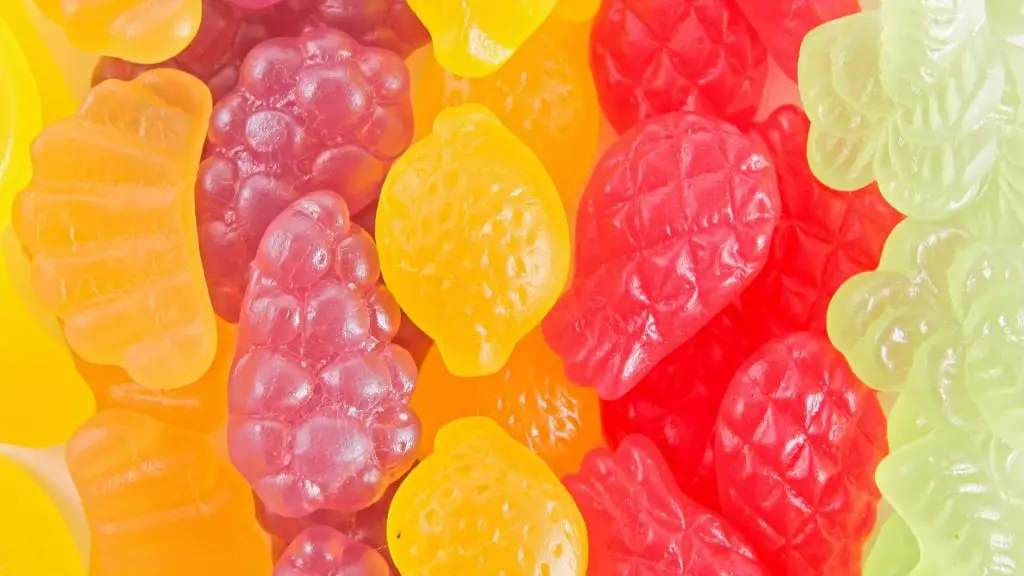
The answer is no. Dogs should not be eating any candy-based fruit snacks. Fruit snacks contain too much sugar or artificial flavors that can cause diarrhea, vomiting, and upset stomach.
The only kind of fruit snack that would be acceptable for dogs is if the fruit snack contained real fruit and no added sugar or other harmful ingredients.
Most processed fruit snacks on the market today are not good for dogs (or humans for that matter). They are filled with artificial flavors and added sugars that can cause dogs health problems down the road.
If you’re looking for a healthy snack for your dog, consider giving them some actual fruit. There are many fruits dogs can eat in moderation. So opt for real whole fruit if you are looking to give them a snack.
Can Dogs Eat Welch’s Fruit Snacks?
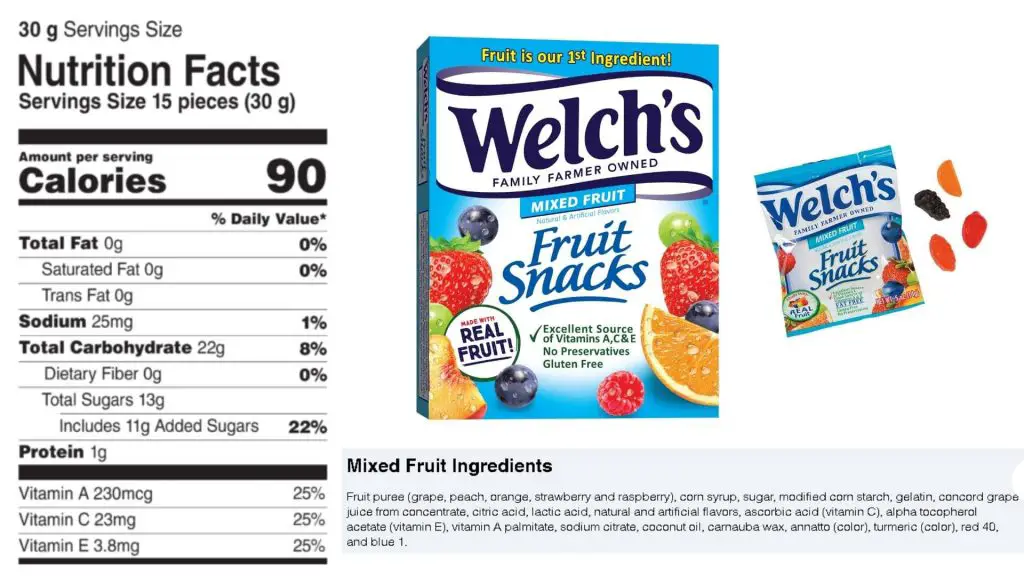
No, Welch’s Fruit Snacks are not good for dogs. Even though they only contain fruit juices, they can still have negative health effects on dogs.
After examining the composition of Welch’s Fruit Snacks, we found that they consist mostly of sugars, sweeteners, artificial flavors and colors, and preservatives.
These ingredients have been linked to several health problems in dogs, including obesity, diabetes, inflammation, and cardiovascular disease.
So can dogs have welch’s fruit snack?
No, they should not. While one or two is unlikely to cause any harm, welch’s fruit snacks contain harmful ingredients and little to no beneficial ingredients for a dog.
Can Dogs Eat Motts Fruit Snacks?
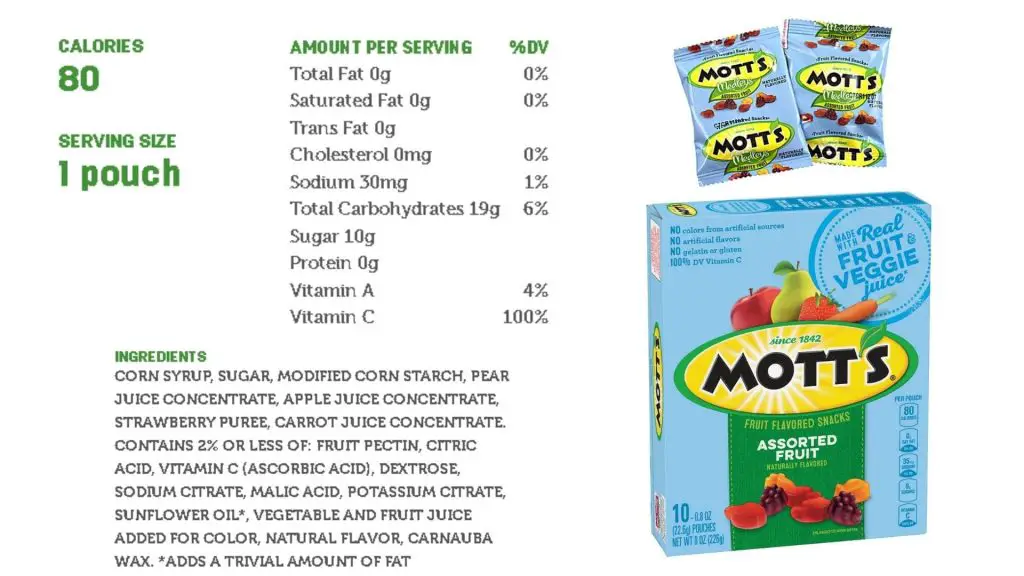
No, Welch’s Fruit Snacks are not good for dogs. Even though they only contain fruit juices, they can still have negative health effects on dogs.
After examining the composition of motts’ Fruit Snacks, we found that they consist mostly of sugars, fruit juice concentrations, artificial flavors, and preservatives.
These ingredients have been linked to many health problems in dogs, including obesity, diabetes, inflammation, and cardiovascular disease.
So can dogs have welch’s fruit snack?
No, they should not. While one or two probably won’t cause any harm, welch’s fruit snacks contain harmful ingredients and have no beneficial ingredients for a dog.
Can Dogs Eat Gummy Fruit Snacks?
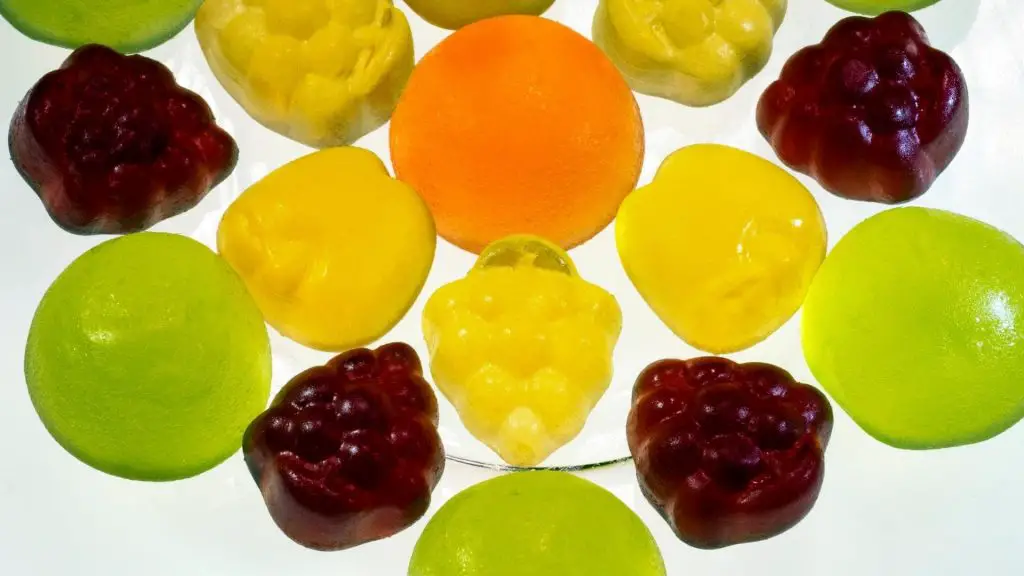
All forms of gummy fruit snacks should be off-limits to dogs. Gummy fruit snacks usually contain high fructose corn syrup, gelatin, and added sugars, which can cause stomach upset and diarrhea in dogs.
In addition, many gummy fruit snacks contain xylitol, a sugar alcohol toxic to dogs. In dogs, Xylitol can cause low blood sugar, seizures, and liver failure.
So can dogs have gummy fruit snacks?
Not they should not.
Dangers Of Dogs Eating Gummy Fruit Snacks
Fruit snacks are bad for dogs to eat. They contain ingredients that put them at risk for developing health problems.
So it’s important to keep fruit snacks away from our beloved furry family members.
Here are some of the most prominent dangers when it comes to dogs eating fruit snacks:
Sugar
Sugar is a manufactured food that has harmful effects on both people and dogs. The more sugar a dog is exposed to, the greater its health risks are.
Here are a few repercussions of feeding dogs too much sugar:
- Upset stomach
- Vomiting
- Diarrhea
- Weight gain & obesity
- Diabetes
- Heart disease
- Joint problems
Another issue that’s caused by overconsumption of sugar is hyperglycemia. Hyperglycemia is a medical condition with an overabundance of sugar in the blood. This can lead to serious health issues.
Dogs’ systems cannot process sugar as well as humans, so even small amounts of sugar have a greater impact on them than on us.
Thus, making it easier for dogs to get hyperglycemia.
Artificial Flavors
Blue 1 and red 40 are ingredients found in welch’s fruit snacks. While this particular ingredient will not be in every brand of fruit snacks, most will have similar artificial dyes.
Red 40 is an artificial dye that has been linked to a variety of healthcare issues. In fact, it’s well known due to its bad reputation. Red 40 is said to contain carcinogens, which can lead to cancer.
Blue 1 dye isn’t any better for dogs. While it is approved by the FDA, it has been linked to cancer and issues with reproduction in rats.
So while it hasn’t been directly tested on dogs, there are zero benefits it provides and possible risks. So it is better to just avoid feeding your dogs foods with artificial flavors.
Xylitol
Xylitol is a sugar alcohol that is found in many fruit snacks. It’s used as a sweetener because it’s a low-calorie alternative to sugar.
However, xylitol is toxic to dogs and can cause serious health problems. In dogs, Xylitol can cause low blood sugar, seizures, and liver failure.
Even small amounts of xylitol can be dangerous to dogs, so it’s important to avoid giving dogs fruit snacks.
Citric Acid
Dogs’ stomachs and taste buds are not compatible with citric acid.
When dogs eat meals high in citric acid, their tummies may become upset, and it can even have an influence on their central nervous system.
The citric acid in fruit snacks can also lead to:
- Upset stomachs
- Vomiting
- Diarrhea
- Dehydration
- Loss of appetite
My Dog Ate Welch’s Fruit Snacks What Do I Do? (Vet Answers)
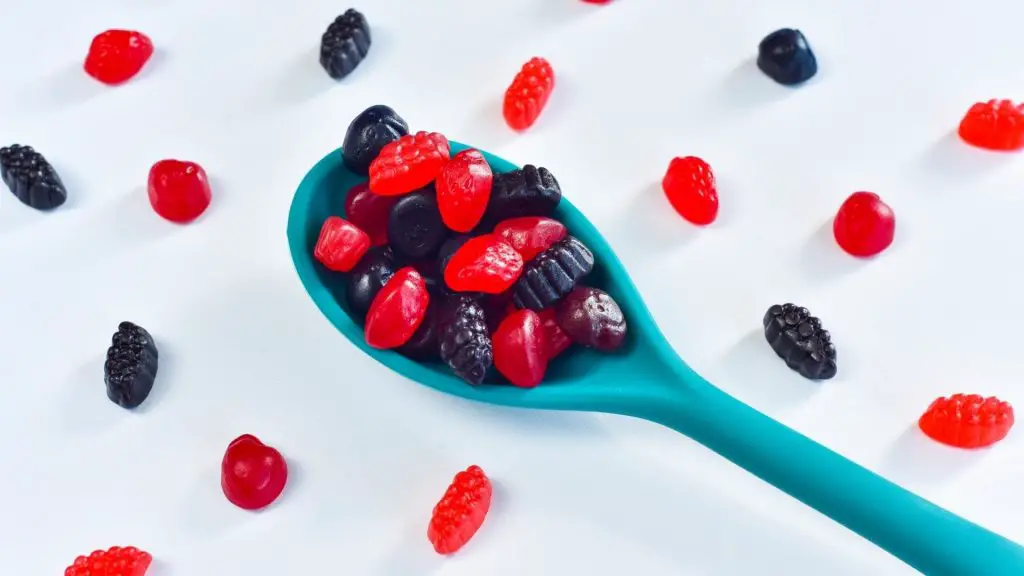
I reached out to Dr. Littlejohn to find out what he’d recommend for caring for a dog that ate too many fruit snacks.
When dogs ingest things they are not supposed to eat, they usually end up with diarrhea and smelly farts.
Some may throw up. However, it depends on how much they got into and how big your dog is.
Vets usually ask the following things when determining the severity of situations around dogs eating things they shouldn’t:
- How long ago did your dog eat the food?
- How much did they eat?
- Are there any toxic ingredients?
- How big is your dog?
- Have you noticed any changes in your dog’s behaviors?
- Is your dog drinking water?
- Any signs of physical pain or discomfort? Vomit? Diarrhea? Blood?
- What’s the color of your dog’s gums?
These questions help the vet examine the situation to determine the level of risk. For example, If you have a tiny dog that ate an entire bag of fruit snacks, they are at a much greater risk than if a large dog ate them.
Knowing the most frequent questions a veterinarian will ask can assist you in determining what to look for in your dog. Since each scenario is unique depending on how much was consumed and your dog’s size, there isn’t a one-size-fits-all solution.
The only thing you can do when a dog overeats something is to wait and see if they start showing any symptoms.
Most of the time, dogs that overeat end up with an upset stomach, diarrhea, and vomiting. These symptoms usually pass within 24 hours and don’t require medical attention.
However, if you know without a doubt that they ate a dangerous amount, you should take them to the vet immediately.
Bloat, pancreatitis, hypoglycemia, and other life-threatening conditions can all come from a dog overeating high sugar foods. So always better to be safe than sorry and take them in for a check-up.
You can also use online services to speak directly with a vet for immediate help. Click here if you’d like to talk with a vet online.
Healthy Fruit Snacks Alternatives For Dogs To Eat
There are many healthy alternative fruit snacks that dogs can actually eat that will benefit them.
For example, dogs can eat a variety of fruits in moderation. So rather than giving them some processed fruit snack, cutting up some whole fruits like apples, bananas, watermelon, or strawberries as a treat is a much healthier option.
Here are some other fruits dogs can eat in moderation:
- Apples
- Bananas
- Blueberries
- Cranberries
- Cucumbers
- Mango
- Oranges
- Pineapple
- Strawberries
- Watermelon
Additionally, there are many brands of dog treats that make fruit-flavored snacks that are safe for dogs to eat and good for them. These snacks usually have limited ingredients and no artificial flavors or sweeteners.
One example is Fruitables dog treats. These are specially designed for dogs and come in various flavors like pumpkin & apple, strawberry & banana, and blueberry.
So while fruit snacks are generally not good for dogs, there are some healthy alternatives that you can give them instead.
Please consult your veterinarian if you have any further questions about whether or not dogs can eat fruit snacks.
Other Frequently Asked Questions
Can Dogs Have One Fruit Snack?
As mentioned before, one or two fruit snacks are not likely to cause any harm to your dog. However, it’s still not recommended to feed them any fruit snacks.
They provide no benefit to a dog’s health and can even be dangerous. So it’s best to stick to healthy alternatives like whole fruits or specially made dog treats.
Can Dogs Eat Grapes?
No, dogs should not eat grapes. Grapes and raisins are one of the most toxic foods for dogs. They can cause kidney failure and death in dogs.
Even a small amount can make a dog sick. So never allow your dog to eat grapes.
Can Dogs Eat Dried Fruit?
Dried fruit is not recommended for dogs either. While the drying removes some of the water content, it concentrates the sugars and other nutrients.
Store-bought dried fruits can also contain hazardous chemicals that are harmful to dogs. So generally, dried fruits are not the best option for dogs. However, some dried fruits might be okay for dogs, but fresh fruit is much better for them.
Final Thoughts
In conclusion, fruit snacks are not good for dogs to eat. They contain harmful ingredients that can cause health problems in dogs.
The high sugar levels, artificial flavors, and other chemicals make fruit snacks bad for our furry friends.
If you want to give your dog a treat, there are many healthy alternatives that are specific to dogs.
These options benefit a dog’s health and are much safer than feeding them fruit snacks.
Other posts you might find interesting:
Can Dogs Eat Bitter Melon? Benefits + Risks (Vet Answers)
Can Dogs Eat Honey Nut Cheerios? Dangers (We Asked A Vet)
